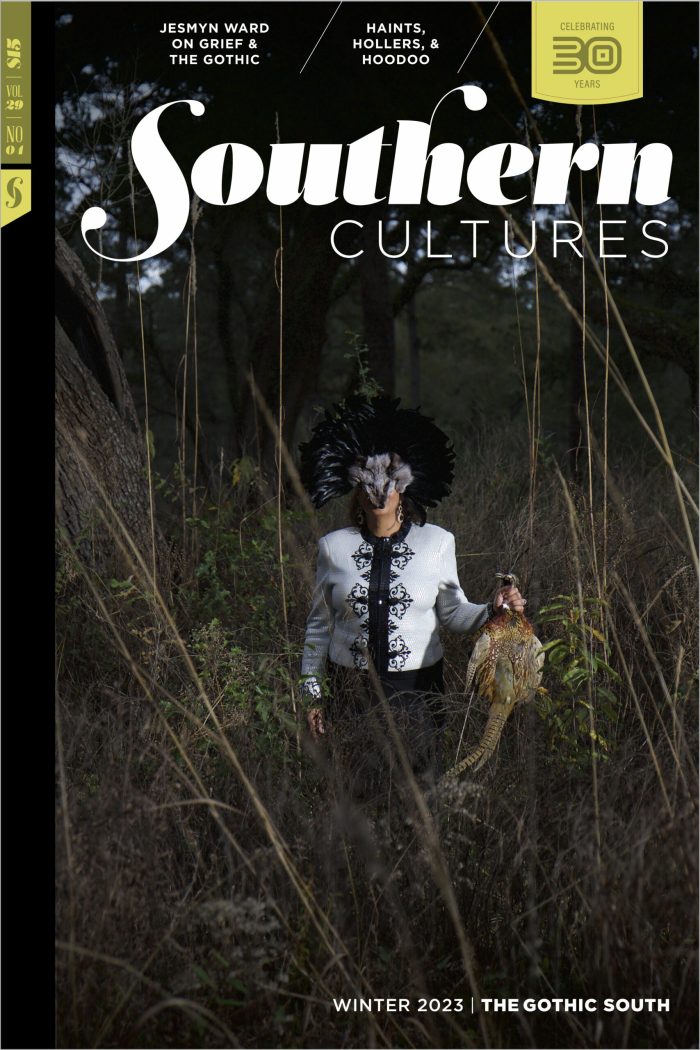by Southern Cultures Editors
“Daddy said he wouldn’t go to church, so she shot him.” They are hastily put-together things, often arriving here on the front lines in used envelopes with the flaps re-taped. Sometimes they arrive postage due. The notes inside occasionally reflect a disdain for punctuation and a distinct irreverence toward spelling. They boast of shared ancestry, »
by Harry L. Watson
“‘It ain’t bragging if you can prove it.'” As you might have already guessed from Doug Marlette’s cartoon, a wonderfully playful jab at one of our two coeditors, this issue of Southern Cultures is a little different. John Shelton Reed retired this summer after thirty-one years at the University of North Carolina at Chapel Hill. Fortunately »
by Doris Betts
“Nobody enjoys getting his tongue extended far into his cheek more than Reed, and few have such a reach.” As a fiction writer, I used to complain that sociology was the academic discipline most opposite, in some cases even most inimical, to literature. After all, the average sociologist seemed to conduct boring surveys that led »
by Michael O'Brien
“It is the illusion of his style that Reed is a sort of good old boy, sitting on his porch, swigging his whiskey, going out the back to shoot hapless mammals.” I am commissioned here to discuss the influence of John Shelton Reed. But on whom? On historians of the American South, like myself? I »
by James C. Cobb
“The object of John’s climb is what is presumed to be a coon nestled among the giant sweet gum’s topmost branches.” When it comes to milking an anecdote, John Reed has no equal and few competitors. It seems appropriate, therefore, to begin an essay about his work with a story. In one of his best-known »
by Anne Goodwyn Jones
“‘Southerners can’t grasp anything that isn’t couched in a Br’er Rabbit tale. They got cornmeal mush for brains.'” Epigraphs Assignment: In the epigraphs below, kindly circle the terms associated with abstraction, generality, anywhere, anyone, and Platonic idealism, and underline those associated with concretion, particularity, somewhere, someone, and Aristotelian materialism. The ideology of New Criticism began »
by David L. Carlton
“Reed burst on the southern scene in 1972 as a contrarian, and, as we know, he has remained very much a contrarian to this day.” Any understanding of John Shelton Reed’s legacy to the study of southern history should begin with an appreciation of his pivotal position within modern southern intellectual history itself. Reed burst »
by Larry J. Griffin
“Even as he turned to a form of largely conservative cultural commentary on all sorts of things, Reed retained a keen sociological consciousness.” Some months ago, I gave a talk on the American South at the University of Mississippi. During the question-and-answer session that followed, a southern historian noted the prominence of the “ubiquitous” (his »
by Eugene D. Genovese,
Elizabeth Fox-Genovese,
John Shelton Reed
“I don’t have much patience with folks who say the Civil War was not about slavery.” Editor’s note: On a Saturday afternoon in August 2000, John Reed sat down for a conversation with Betsey and Gene Genovese, noted historians of the South, at their home in Atlanta. The tape recorder was turned on— JOHN SHELTON »





